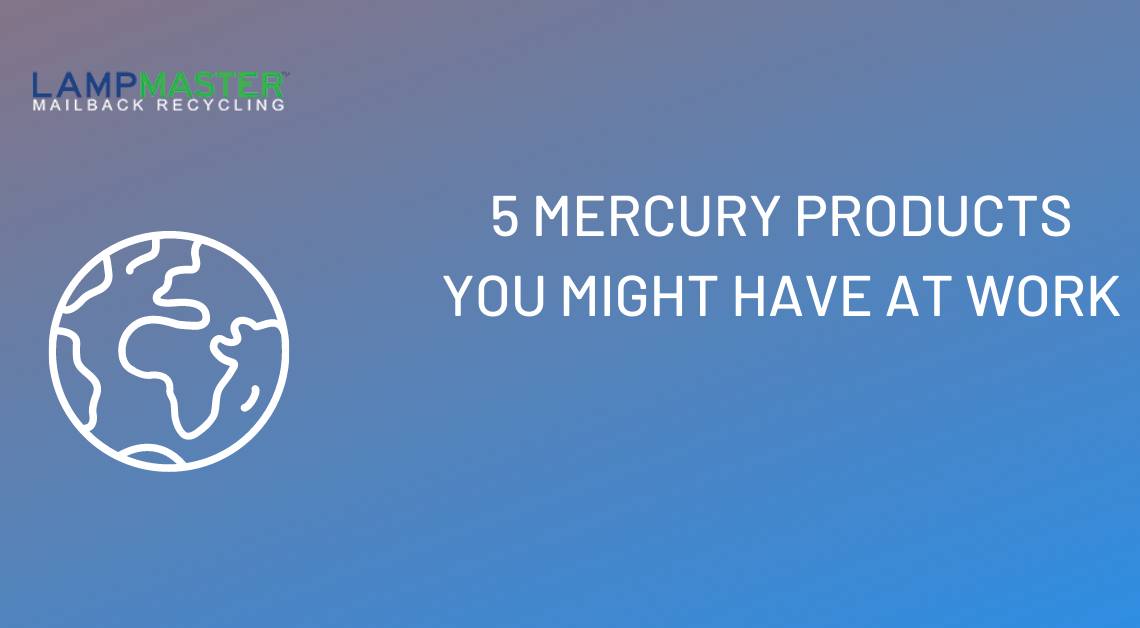Like all things, mercury is okay in moderation.
But frequent exposure to mercury can pose significant health risks, especially for developing fetuses and young children. The EPA estimates 75,000 newborns have an increased risk of learning disabilities due to in-utero mercury exposure.
Mercury is more common than you think, and there may be mercury products hiding in your office.
Let’s review some of the most common mercury products found in American offices.
1. Older Appliances
Newer appliances tend to be mercury-free. But if your office is using older models, they may contain mercury.
Common office appliances that contain mercury include gas freezers, space heaters, and gas-fired devices.
When it comes time to dispose of these products, contact a professional recycling company. If you are unsure of whether the products contain mercury, reach out to the manufacturer.
2. Certain Types of Batteries
One of the most notorious products with mercury is batteries.
While mercury-based batteries are used globally, their prevalence in the United States has significantly decreased. This is due to The Mercury-Containing and Rechargeable Battery Management Act of 1996. The statute led to a replacement of mercury-based batteries with alkaline ones.
However, button cell batteries and mercuric oxide batteries still contain mercury. If you have these batteries in your office, you must follow mercury recycling protocols when disposing of them.
Button cell batteries look like silver coins. They are found in cameras, digital thermometers, calculators, and watches. Mercuric oxide batteries are only used in military and medical equipment.
3. Light Bulbs
The light bulbs throughout your office may contain mercury if they are:
- Compact fluorescent light bulbs (CFLs)
- High-intensity discharge (HID) bulbs (most commonly used for industrial, street, and parking lot lighting)
- Neon/ argon lamps (primarily used in electric signage)
Many offices use fluorescent bulbs because they provide ample lighting while using less energy. If your office uses these lighting fixtures, be sure to properly recycle the bulbs to prevent mercury pollution.
4. Computers
Computer monitors and LCD screens contain mercury. Most televisions produced prior to 1991 may also include mercury.
In addition to mercury, computers contain chromium, lead, and cadmium. These heavy metals are not easily degraded. They can release harmful contaminants into the environment if not properly recycled.
5. Office Antiques
Mercury devices come in all shapes and sizes, and some disguise themselves as office decor. Antique products may look aesthetic, but they are more likely to contain mercury than newer devices.
If you have antique objects around your office, they may contain mercury. Common antiques with mercury include:
- Clock pendulums
- Mirrors
- Barometers
- Vases
- Mirrors
Keep in mind newer versions of these products are not as likely to contain mercury. For example, silvered and tin mirrors once contained 25% mercury. But in the 1840s, manufacturers switched to silver nitrate, which is still used today.
Recycle Mercury Products in Your Office
From antiques to computer monitors, mercury is common in the office. If you are wondering how to recycle mercury office equipment, let our team help.
Learn more about our recycling services and how we help your office safely recycle its mercury products.


